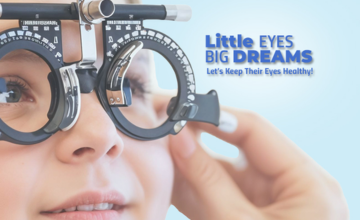- Email: info@swarupeye.com
- Hyderabad
- Call: +918886309030
Paediatric Ophthalmology
PEDIATRIC OPHTHALMOLOGY
When it comes to eye exams and treating eye conditions, children require more care and attention than adults. Swarup's pediatric ophthalmology services are prepared to offer the best care for children's eye issues, no matter how simple or complex. Skilled medical professionals can diagnose and treat children's eye issues under one roof, using cutting-edge surgical techniques.
Pediatric ophthalmologists are trained to handle the unique needs of children, who may not be able to express their symptoms as clearly as adults.

Common Conditions Treated:
- Refractive errors:
- Nearsightedness, farsightedness, and astigmatism.
- Strabismus (crossed eyes):
- Misalignment of the eyes.
- Amblyopia (lazy eye):
- Reduced vision in one eye.
- Congenital cataracts:
- Clouding of the lens present at birth.
- Congenital glaucoma:
- Increased eye pressure present at birth.
- Retinopathy of prematurity (ROP):
- A condition affecting premature infants.
- Blocked tear ducts:
- Obstruction of the tear drainage system.
- Eye infections and injuries:
- Children are very susceptible to these.
When to See a Pediatric Ophthalmologist:
- If you notice any signs of eye problems in your child, such as:
- Crossed or wandering eyes.
- Excessive tearing.
- Redness or discharge.
- Frequent eye rubbing.
- Difficulty seeing.
- White pupil.
- For routine eye exams, especially if there's a family history of eye problems.
- If your child was born prematurely.
Guidelines for Vision Screening and Comprehensive Eye Examination in Children
| When | Recommendation |
|---|---|
| Neonates High risk cases* | At discharge Within 1 month |
| Birth-3 years | Vision screening by an ophthalmologist at least once |
| 3-5 years | Comprehensive eye examination by an ophthalmologist at least once |
| 5-8 years | Comprehensive eye examination by an ophthalmologist at least once |
*High risk cases- Premature, low birthweight, Down's syndrome, etc.
What to Expect During an Exam:
- Pediatric ophthalmologists use specialized techniques and equipment to examine children's eyes.
- Pediatric ophthalmologists do complete examination by putting the dilating drops, so examination may take up to 2 hrs.
- They create a comfortable and child-friendly environment.
- They may use age-appropriate vision tests.
Key Points:
- Early intervention is essential for optimal visual outcomes.
- Pediatric ophthalmologists are specially trained to care for children's eyes.
- Regular eye exams are vital for children's overall health.
Expert Consultation at Swarup Eye Centre:
At Swarup Eye Centre, our pediatric ophthalmology team is specially trained to diagnose and treat eye conditions in infants, children, and adolescents. We understand that examining children requires patience, special techniques, and a child-friendly environment. Our specialists use age-appropriate methods to ensure accurate diagnosis and effective treatment while making the experience as comfortable as possible for both children and parents.
Frequently Asked Questions
- At what age should my child have their first eye exam?
All newborns should have their eyes checked before leaving the hospital. High-risk infants (premature, low birth weight, family history of eye disease) should be examined within 1 month. All children should have vision screening by age 3. - How often should my child's eyes be examined?
After the initial screening, children should have comprehensive eye exams at ages 3-5 and 5-8. Children with existing vision problems or risk factors may need more frequent examinations as recommended by their pediatric ophthalmologist. - What signs might indicate my child has vision problems?
Watch for signs like squinting, sitting too close to screens, tilting the head to see better, excessive eye rubbing, frequent headaches, poor school performance, or difficulty with activities requiring good hand-eye coordination. - Can vision problems affect my child's learning ability?
Yes, undetected vision problems can significantly impact a child's learning ability. Good vision is crucial for reading, writing, and other classroom activities. Early detection and treatment of vision issues can help prevent academic difficulties.
